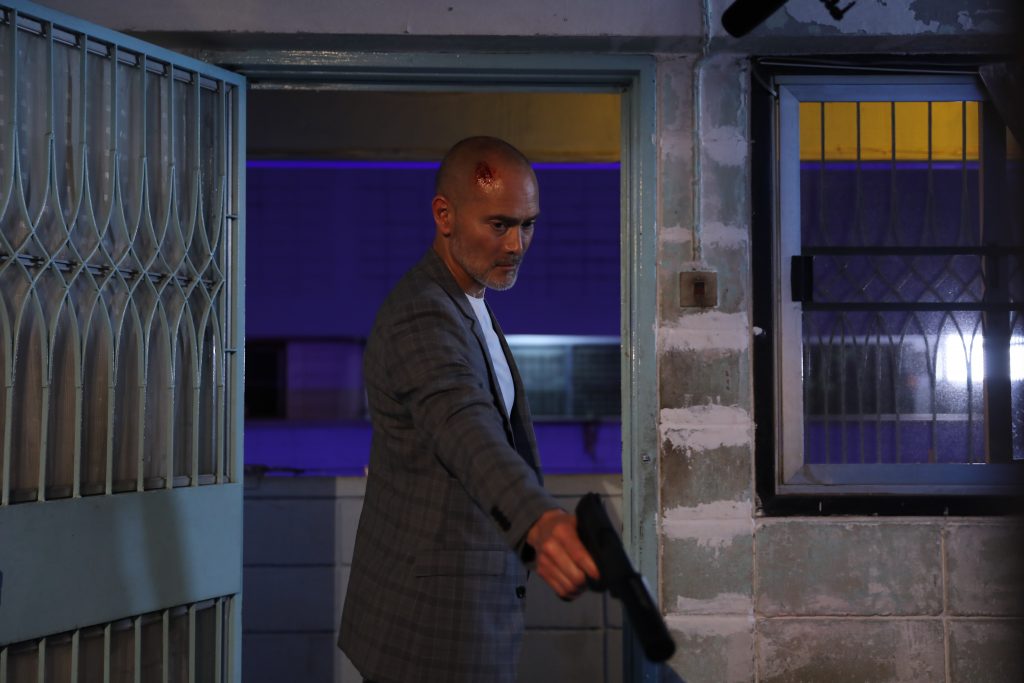September 7, 2020
by Carla Hay

Directed by Wych Kaosayananda
Culture Representation: This crime drama, which takes place in the Thailand capital of Bangkok, features a predominantly Asian cast (with a few white people) representing the middle-class and wealthy.
Culture Clash: A man on a deadly revenge mission hires an unsuspecting rideshare driver to take him to various places where he murders people.
Culture Audience: “One Night in Bangkok” will appeal primarily to people who don’t mind watching dull, derivative and mindlessly violent movies.

The crime drama “One Night in Bangkok” has nothing to do with Murray Head’s 1985 “Chess” musical song “One Night in Bangkok.” And unfortunately, logic and good storytelling had nothing do with this dreadful movie.
“One Night in Bangkok” is really just a vastly inferior ripoff of director Michael Mann’s 2004 thriller “Collateral,” starring Jamie Foxx and Tom Cruise as a taxi driver and a hitman who are caught up in the hitman’s murder spree during the course of one night. Foxx earned an Oscar nomination for his role in “Collateral,” which was also Oscar-nominated for its film editing. The only distinction that “One Night in Bangkok” has is that it’s one movie in a long list of bad movies written and directed by Wych Kaosayananda, who also directed and co-wrote the notorious 2002 stinker “Ballistic: Ecks vs. Sever,” starring Antonio Banderas and Lucy Liu.
“Collateral” was told from the point of view of the driver, but “One Night in Bangkok” shifts the point of view to the hitman. His name is Kai Khale (played by Mark Dacascos), an American who has traveled from Hawaii to Bangkok. When he arrives in Bangkok, he is picked up by an unidentified man on a motorbike. The mystery man gives Kai a duffel bag that contains cash, a mobile phone and a gun with a silencer. Kai’s demeanor is calm and measured, as if he knows where he’s going but he’s in no big rush to get there.
The next thing that Kai does is call a rideshare service. He books a ride with a driver named Vanida “Fha” Hoffstead (played by Vanida Golten). It’s now 8:10 p.m. Kai and Fha strike up a pleasant conversation on the way to his first destination, which is an insurance company. Kai says he’s going there to see a lawyer. It’s an unusual time to have an appointment at an insurance company, but Fha assumes that the lawyer must be working late.
Fha tells Kai a little bit about herself during their small talk. She says she prefers to be a rideshare driver at night because she has more time during night hours. But then Kai gets a little creepy and starts asking her some inappropriate personal questions, such as asking her how she deals with men who proposition her because she’s so pretty.
Kai also asks Fha, who tells him that she’s single, why she’s not married. “I never got around to it,” she replies. Kai is so polite when he makes these intrusive comments, and even apologizes in advance for being so nosy, that Fha openly answers his questions with no hesitation.
Fha also reveals a little bit of her background: She’s lived in Thailand for her entire life. Her father is British, and her mother is Thai. Fha also mentions that her brother has multiple sclerosis. Kai sympathetically replies that he used to be a field medic “a long time ago.”
He won’t say much else about himself, except when he rambles later in the conversation about how much he loves fishing. (You can bet that there’s a reason why fishing is brought up in the story.) Fha says that she studied English in college, but she’s still trying to learn to speak English better, which she does mostly by watching movies and YouTube videos.
Kai then continues with his nosy questions, by asking Fha what she makes as a rideshare driver on a typical Friday night. She tells him that she can make $1,000 to $1,200 on a good Friday night. Kai then tells her that after he leaves the insurance company, he has to make four more stops at four different places: a police station, a nightclub, a hospital and a house.
Kai offers Fha $5,000 in cash if she drives him to all of the stops on his journey. He says that he can give her $1,000 as an up-front deposit, and that she’s free to end the trip at any time. Fha will get the remaining $4,000 if she drives Kai to all of the places that he requested that night.
At this point, anyone with street smarts would suspect that there’s an illegal reason for this unusual offer. Why else would the payment be so high for the simple task of driving someone to more than one destination? However, Fha seems to be easily fooled because Kai is wearing a business suit and has a smooth and polite demeanor.
Fha asks him why he needs to make these stops, and Kai replies that it’s about a case involving his daughter and her family. Kai also says he needs to “repay” the people involved in the case. Kai also tells Fha that she can ask him any questions, but she can’t look in his duffel bag. Instead of seeing these “red flag” warning signs that she’s about to mixed up in something illegal if she says yes, Fha agrees to the deal and foolishly mentions that it’s because she needs the money.
Of course, Kai isn’t in Bangkok on legal business. He has a vendetta that he’s going to carry out by murdering at every stop that he makes. The reason for this killing spree is revealed in the last third of the movie. There’s also a surprise “twist” which isn’t that shocking, considering everything that happened up to this point had signs indicating that there would be this “twist.”
Kai kills the people on his hit list in a methodical way and by making no attempt to disguise himself. One of the victims fights back, and the brawl leaves Kai with a big bloody gash on his bald head. When Fha sees the wound, Kai gives a flimsy excuse that he fell down somewhere. Fha’s reaction is to treat his head wound as if she’s the friendly neighborhood rideshare nurse and then she continues on the journey with him. Little by little, Kai tells Fha the real reason for his trip to Bangkok.
Meanwhile, a dumb movie like this has to operate under the premise that a big city like Bangkok only has a few bungling cops who are investigating this alarming shooting spree that’s taking place in a short period of time. (The whole story is supposed to take place within a six-hour period.) It’s the kind of movie where the cops show up too late at a crime scene and don’t make good use of surveillance video to figure out quicker who’s the killer.
The lead police investigator is named Dom (played by Michael S. New), whose cop partner is named Korn (played by Prinya Intachai), and their handling of the investigation is amateurish at best. Dom is so incompetent that he has to call his cop wife, who’s on maternity leave at home, to ask her to do some of his computer work for him. There’s also an unnamed Japanese fixer (played by Kane Kosugi) who’s part of the story.
The biggest problem with “One Night in Bangkok” (besides the terrible acting) is that for a movie that’s supposed to be a thriller, the pacing is too slow. The actors often speak at a sluggish and wooden pace. And there’s not much suspense to the story.
Kai goes from one murder to another with empty-headed Fha, who hasn’t figured out that whatever money she’s being offered by this stranger, it isn’t worth becoming an accomplice to murder. Surveillance cameras and eyewitnesses would be able to identify her as the getaway driver, since her car is being used in this killing spree.
It’s not a spoiler to say that Fha eventually finds out that Kai is killing people. And the reason why she stays with him is as pathetic as this movie: “You’re the first man in my life who’s showed me respect,” Fha says to Kai when she tells him why she won’t abandon him during his murder spree.
Fha’s complacency is probably the biggest difference between “One Night in Bangkok” and “Collateral,” which derived much of its suspense from the driver wanting to get away from the hitman. There is no such tension in “One Night in Bangkok,” which gets worse as the killings go on, because Kai gets messier and more brazen with each killing, and Fha does nothing to stop him. The worst scene is in the hospital, which ridiculously has no staffers and visitors when Kai does what he does there.
Sometimes a poorly written movie with terrible acting can be watchable if there’s enough action and suspense. Because “One Night in Bangkok” falls short in all of these areas, what’s left are a lot of bloody scenes, characters people won’t care about, and viewers’ sinking feeling that they could’ve spent 105 minutes of their time in a much better way than watching this boring dreck.
Lionsgate released “One Night in Bangkok” on digital, DVD and VOD on August 25, 2020.
